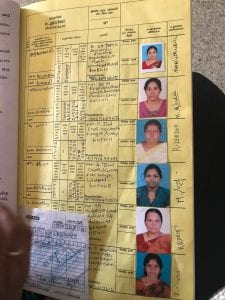The NGO I worked with, India Volunteer Care (IVC), is greatly involved with the microfinance programs offered in India, linking them with banks and assisting them to secure finances in order to generate sustainable income. In fact, they help 150 Self-Help Groups with roughly 10-20 women within their organisation, which was tremendously beneficial for my engagement, since it enabled me to meet more women involved in microfinance programs, eventually strengthening my knowledge about the program.
I had the opportunity to meet 12 SHGs, which I believe allows me to acquire a broader understanding of the perspective of the women most actively involved in the microfinance program. One of the commonalities between the majority of all the women I had interviewed was that they made all, if not the majority of, the decisions for the family following their participation in the microfinance program. Not only is this a remarkable change that has been successfully created solely by the hard-work and determination of the women, but it speaks to the effectiveness of this program to empower women in Pondicherry. Throughout the interviews, I was in awe of the independence of the women that sat before me, as I learnt about what invigorated them to form SHGs or about the benefits the program has caused to their lives. I think the women have been able to earn themselves respect in their households, especially given their preceding poverty status, because it shows them shouldering the burdens of the household in a more modern and equal way. In small towns or rural areas in India particularly, there is a belief that women are best to remain in the households, caring for the children, whilst the man assumes the role of the breadwinner. However, with the growing presence of microfinance all over India, there is a way for women to generate an income for themselves and their family, even if they haven’t yet had the sufficient education or training required for that field. As such, I believe that microfinance provides women with a way to challenge commonly-held and regressive social norms in a patriarchal Indian society, which inhibit the ability to improve their well-being themselves. Another thing that I learnt from the greater decision-making power of women under this program is that the impacts of empowerment through microfinance are social, and thus culturally relative. In fact, when asked about the familial decision-making power held prior to participation in microfinance programs, one woman said: “husbands stay quiet while women make the decisions of the house”. Since I am from the north of India, where patriarchal demonstrations occur at a far greater frequency, this greater gender equality of the South of India was a revelation for me. I think this allows me to broaden my scope of analysis into my political issue when the time comes to actually write it.
Here are some photos I took during my visits to different self-help groups.





